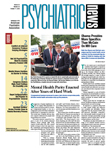As reported in the June 6 issue, APA's 2008 annual meeting workshop for consultation-liaison psychiatrists emphasized that “off-label prescribing is also an integral part of medical practice [and] the Food and Drug Administration's (FDA's) authority is to regulate manufacturers' marketing of drug products, not how drugs should be prescribed.” However, only the off-label use's practical consequences were offered, not its ethics or an explanation of why such uses are not approved by the FDA.
The Food and Drug Act's authority cannot prescribe inspection of“ medical practices” within the states because medical licensure is a constitutionally protected arena of state law; this creates a legal schism between approval for interstate commerce purposes and state licensure to practice medicine.
The FDA's role in interstate commerce protects the public from production of unsafe foods, drugs, medical devices, and cosmetics; protects the rights and safety of patients in clinical trials of medical products; and regulates promotional activities of drug and device manufacturers. But the FDA cannot routinely invade the sanctity of the physician's state-licensed private office for nonopiate prescribing practices. Thus, doctors who may believe that their off-label use of medications for unapproved indications is an ethical use of a medical license should also consider the following:
For a drug to be federally approved, reasonably rigorous and highly expensive studies have to be submitted to institutional (peer) review boards and the FDA; clinical trials must be registered and published; researchers' potential conflicts of interest must be revealed; and sales are regulated through interstate commerce for physician/patient protection.
It is hardly ironic that after such great scientific and technological expenditures to prove a drug's worth and safety and support from peer-reviewed publications is obtained, the pharmaceutical companies neither make disclaimers for unapproved use nor complain about physicians who ignore the evidence for the researchers' hard-won, highly competitive work.
On balance, where there is protection for the professional, there ought to be ethical responsibility. Modern ethics—from Hobbes to Hume, and Immanuel Kant to the Utilitarians—dictates that if doctors believe a particular medicine used for an unapproved indication is “good” for the patient, albeit legal, they still must consider that the ethical basis for the act may be missing. Kant says that social morals may be recognized as separate from individual ones when we examine the distinction between duty out of respect for the law and inclination based on prudence—the distinction being between the “I want” (self-interest) and the “I ought” (ethics). Absent that consideration, efforts at medical education and licensure to treat illness would have neither consensual validation nor an ethical foundation.
As it's legal to use drugs “off label,” physicians need only accept that the act is not necessarily ethical—it may lack the moral maxim that it's good for all—and then they can prescribe for what they believe is in the best interest of their patient.
